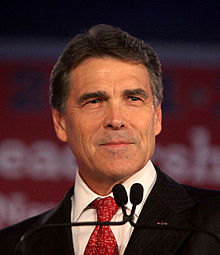 By Earl Ofari Hutchinson, New American Media
By Earl Ofari Hutchinson, New American Media
LOS ANGELES, Calif.-- GOP presidential contender Rick Perry made quiet news recently when he attended a semi-hushed confab of some of the nation's top hard-nosed Christian evangelicals at a ranch west of Austin, Tex. It was an indication that the Texas governor is banking heavily on their outsized numbers and political muscle to help power his presidential run.
Even more interesting are the signs that Perry will not be shy about reaching out to Black evangelicals. He chose to launch his campaign informally at a giant Call to Prayer Rally last August in Houston. The event drew thousands, including a large number of Black evangelicals. At the Texas confab, noted Washington D.C. mega-church pastor Harry R. Jackson Jr. was present.
It's too early to tell whether Jackson's support and the religious passion of the many Black worshippers at the Houston rally will ultimately translate into political support and votes for Perry. But two things are certain: First, Perry will try to duplicate George W. Bush's fete and garner support from some conservative Black religious leaders.
Second, if Perry is successful in grabbing the GOP nomination, his wooing of Black evangelicals will pose yet another political worry for President Obama's reelection bid.
Game-Changer in Battleground States
Bush understood, in his difficult reelection bid in 2004, that upping the number of Black votes by a small percentage in the key battleground states of Ohio and Florida could be a political game-changer. This would give him just enough of an edge in a close contest with Democratic presidential contender John Kerry to tilt the race and keep him in the White House.
That's exactly what happened. Nationally, Black evangelicals voted overwhelmingly for Kerry. But in Ohio, they gave Bush the mild boost he needed – nearly 20 percent of the Black vote -- to secure victory. He achieved that support by appealing to the emotions that swelled up behind an anti-gay initiative on the state ballot, and by ramping up the dollars he spread to conservative ministers and their faith-based programs.
Polls at that time showed Black people were primarily concerned with bread-and-butter issues, especially jobs, and other things they believed Democrats were more likely to deliver on. But there was also a sizeable portion of the Black population whose views on social issues were more akin to conservative Republicans like Bush.
Quite a few Blacks, for example, ranked abortion, gay marriage and school prayer as major issues for them. More to the point, a large number were virulently hostile to gay marriage and abortion, as well as being staunchly pro-prayer.
A 2004 poll by the Joint Center for Political and Economic Studies found that Blacks opposed gay marriage by a far bigger margin than the overall population. Many also loathed Kerry for his perceived support of abortion. In polls, he got 20 percent less support from Black conservative evangelicals than Democratic presidential contender Al Gore received in the 2000 presidential election.
In 2004, Black church leaders reciprocated Bush's aggressive courting. They not only endorsed Bush, but also actively worked for his re-election and encouraged members of their congregations to do the same.
A much different story emerged in 2008. GOP Presidential candidate John McCain was anathema to nearly every conservative evangelical group. He did absolutely nothing to actively court Black evangelicals. It wouldn't have mattered that year if he had. Black conservative religious leaders were too swept up in euphoria not support the election of the first African American president, as were most Black voters.
Why Perry is Different
But Perry is different. In a very public and well-calculated way, he has signed pledges against gay marriage and abortion. And he's made it a point in interviews with the Black media to tout his appointments of African Americans to nearly every major state board, committee and court in Texas--including the Texas Supreme Court.
But it's the religious card that's Perry's trump. Unlike Bush, however, Perry does not control millions in federal funds to ladle out to faith-based programs. Also, gay marriage and abortion, once perennial GOP wedge issues, have not stirred the same political mania they did in 2004.
But if Perry winds up being the GOP nominee, he can count on support from a noisy coterie of Black conservative activist groups and Tea Party supporters, who will almost certainly toss their support to Perry.
The rare confluence of money, emotion, religious zeal and bigotry—laced with cunning political calculation--came together in 2004, to enable Bush the Younger to get just enough black support to help him keep the White House.
The odds of that happening again with Perry are much longer. But that doesn't mean he won't try to duplicate Bush's fete and beat the odds.
Earl Ofari Hutchinson is an author and political analyst. An associate editor of New America Media, he also co-hosts the Al Sharpton Show on American Urban Radio Network. His weekly Hutchinson Report Newsmaker Hour on KTYM Radio Los Angeles is streamed on the ktym.com podcast on blogtalkradio.com and Internet TV broadcast on thehutchinsonreportnews.com. Follow him on Twitter: http://twitter.com/earlhutchinson.
Portland and Seattle
Free Subscription to Breaking News
Free Subscription to Breaking News






















































































































































































































































































































































